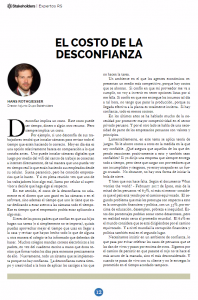El costo de la desconfianza
The cost of mistrust
By Hans Rothgiesser
Distrust involves a cost. This cost can be either time or money or some other resource. However, it always involves a cost.
For example, if you are suspicious of your workers you will have to install cameras to check all the time that they are doing the right thing. Nowadays that is a relatively cheap option compared to what it used to cost. One can even instal digital cameras that are directly connected through the wifi to internet, so that one can see in real time in a cell phone what their employees are doing. It sounds paranoid, but i’ve met entrepreneurs that do exactly that. Moreover, if in the middle of a business meeting they see that one of the workers did something wrong, he calls the supervisor in the cell to tell him to do something about it.
In that sense, the cost of mistrust is not only the money you spent on the cameras or the software, but also the time you spend on watching the cameras all the time. That is time you could be using for something else.
If you are one of the few parents who trust their kids to do their homework (or if you just do not care), maybe you can make better use of the time other parents use to get home and check that their kids have done everything the school somehow has informed you that they should have done. Many schools send e-mails to parents, instead of the handwritten notebook that moms and dads had to sign every day; notebooks that once were so popular. Again, a whole system that is implemented because there is no trust. Mistrust costs time and creativity when there is the need to apply a punishment to those who do not do their homework.
An environment in which the economic agents trust each other is more competitive, because there are costs that are saved. If I trust that my provider will comply with me, I will not invest in having other options ready in case he fails. If I trust that he delivers the supplies on such a day at such an hour, I will not have to stop the production because its effective arrival to the plant is totally uncertain. If there is trust, everything is less expensive.
In recent years there has been much talk about the need to promote more competitiveness in the Peruvian private sector. And on the other hand there is talk of a need for more Peruvian entrepreneurs with values and principles.
This topic applies game theory. I save costs to others as far as I am reliable. What ensures that those I depend on react positively to this and try also to be reliable? If I run a company that always delivers everything on time, but has to deal with suppliers who are unfulfilled and risky, I am trapped in a crossfire. However, there is no other way to start the snowball.
And certainly we need such a ball to roll. According to the document What worries the world? – February 2017 of Ipsos, more than half of the Peruvians – 63%, no more or less – consider that the country is going the wrong way. The second problem that worries them most about this is financial and political corruption, with 53%, above education, unemployment, poverty and inequity. These two percentages may sound disastrous, but they are actually close to the world average. Around 62% of the world believes that they are going the wrong way. And worldwide financial and political corruption is also in second place.
We need to insist in the need for an environment of trust. This means avoiding stop cheering everytime someone thinks he is too clever and just steps over someone else. Let us continue persisting that passing the red does not make you the most astute of the pack, but the most inconsiderate. And neither does going über smart on your client and not delivering what you promised at the agreed time.
Categories
Valen la pena
Info
Copyright © 2024 MilDemonios
Powered by WordPress and Apply Media
